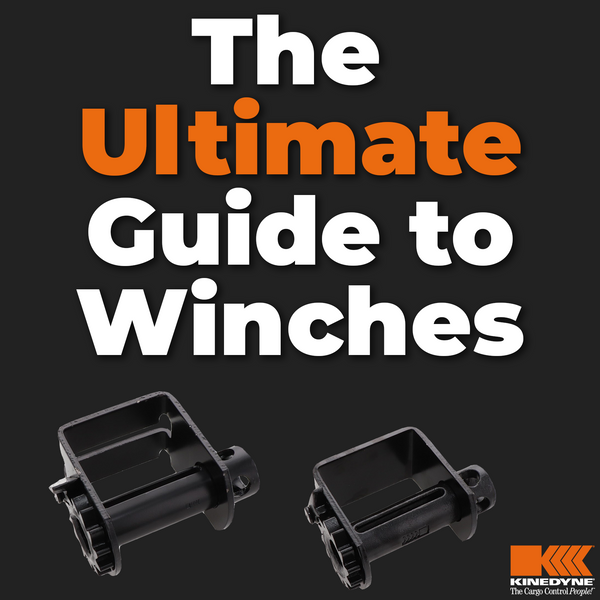Kinedyne's Guide to Winches
Flatbed trailers are essential in transporting a wide array of goods and equipment. Their open design offers flexibility, making them ideal for transporting bulky, oversized, or irregularly shaped loads. However, to ensure the safe and secure transportation of cargo, winches play a crucial role. In this blog post, we will delve into the importance of winches on a flatbed trailer and how they enhance efficiency, safety, and versatility.
Securing the Load: One of the primary functions of winches on a flatbed trailer is to secure the load. With winches strategically placed along the trailer's bed, operators can effectively anchor the cargo and prevent it from shifting or becoming unstable during transit. By utilizing straps, chains, or cables attached to the winches, loads can be tightly fastened, reducing the risk of damage, accidents, or loss of goods.
Versatility: Flatbed trailers are commonly used for transporting various types of cargo, from construction materials to heavy machinery. The versatility of winches allows for customized tie-down configurations, adapting to different load requirements. Winches can accommodate a range of strap or chain sizes, ensuring compatibility with diverse cargo types. This adaptability is invaluable, as it enables operators to transport different loads efficiently without the need for specialized trailers.
Load Distribution: Proper load distribution is crucial for maintaining stability and preventing trailer imbalance. Winches facilitate the even distribution of weight across the trailer's bed. By strategically positioning winches along the trailer, operators can adjust the tension of straps or chains, ensuring that the cargo is centered and balanced. This helps to distribute the weight evenly, reducing the risk of tipping, swaying, or loss of control during transportation.
Enhanced Safety: The safety of both the cargo and other road users is paramount when operating flatbed trailers. Winches play a vital role in ensuring safe transport by preventing load shifts and minimizing the potential for accidents. With properly secured cargo, the risk of items falling off the trailer, causing road hazards or collisions, is significantly reduced. Additionally, winches provide added stability to the load, minimizing the chances of damage due to vibrations, sudden stops, or sharp turns.
Time and Cost Efficiency: Efficiency in loading and unloading cargo is crucial for any transportation operation. Winches simplify the process by providing quick and effective means of securing and releasing loads. Compared to other securing methods, such as ropes or chains alone, winches offer greater control and time savings. The ease of use and rapid securing capabilities of winches help streamline operations, ultimately reducing costs associated with labor and potential cargo damage.
Compliance with Regulations: Transportation regulations often mandate the securement of cargo using specific methods and equipment. Winches are commonly recognized and compliant with industry standards, ensuring that flatbed trailers meet safety requirements. By utilizing winches, operators can demonstrate adherence to regulations and avoid penalties, fines, or delays caused by non-compliance.
Different Kinds of Winches
Stake Pocket Winch
A stake pocket winch offers versatility, easy adjustability, increases space efficiency, is more cost effective, and has a quick and convenient operation. Stake pocket winches provide a versatile securing solution for a wide range of cargo. These winches are designed to fit into the stake pockets commonly found along the sides of flatbed trailers. The stake pockets are standardized, allowing for easy installation and removal of the winches as needed. This flexibility enables operators to configure the winches according to the size, shape, and weight of the cargo they are transporting.
Stake pocket winches offer a high degree of adjustability, allowing for precise tensioning of straps or chains. Unlike permanently installed winches, stake pocket winches can be removed when not in use. This feature optimizes space utilization on the trailer's deck, preventing obstruction and allowing for greater flexibility in load placement. When not in use, stake pocket winches can be easily stored, minimizing the risk of damage or interference with other operations.
Stake pocket winches offer a cost-effective solution for cargo securing. Since they utilize the stake pockets already present on the trailer, there is no need for additional hardware or mounting points. This eliminates the expense associated with installing dedicated winch tracks or brackets. Stake pocket winches provide a user-friendly operation. They can be quickly installed or removed without the need for specialized tools, saving time and effort during loading and unloading processes.
Sliding C Channel Winches
Sliding C channel winches offer a high degree of flexibility in securing different types of cargo. The winches can be adjusted along the length of the C channel track, allowing for precise placement and tensioning of straps or chains. This flexibility enables operators to accommodate various load sizes and configurations, ensuring a secure fit for different types of cargo.
Sliding C channel winches are easily adjusted and all enhanced load distribution on the flatbed trailer. The sliding mechanism of C channel winches allows for quick and easy adjustments. Operators can slide the winches along the C channel track to the desired position and lock them securely in place. This adjustability is particularly useful when securing irregularly shaped or oversized loads that require specific tie-down configurations. By adjusting the winches along the C channel track, operators can ensure that the cargo's weight is evenly distributed, minimizing the risk of imbalance and maintaining trailer stability during transportation.
Weld-on Winches
Weld-on Winches offer superior strength and durability to be able to withstand heavy loads. Since they are permanently welded onto the trailer, they create a strong and secure attachment point for long-term use. The weld-on design ensures that the winch remains firmly in place even under challenging conditions, such as rough terrain or harsh weather. They also offer a streamlined design that eliminates any protrusions or obstructions on the flatbed trailer's surface. By welding the winches directly onto the trailer, there are no additional components or mounting hardware sticking out, reducing the risk of snagging or interfering with other operations. The sleek design of weld-on winches allows for easier loading and unloading of cargo and ensures a clean and unobstructed trailer surface.
Weld-on winches offer customization options to suit specific trailer configurations or cargo requirements. Operators can choose the number and placement of winches based on their needs, allowing for tailored securing solutions. Additionally, weld-on winches can be welded onto various surfaces beyond flatbed trailers, such as truck beds or equipment racks, providing adaptability for different types of hauling applications.
They are also commonly recognized and compliant with industry regulations and standards for cargo securement. By permanently welding the winches onto the trailer, operators can demonstrate adherence to the required safety guidelines. This helps ensure regulatory compliance, reducing the risk of penalties or delays due to non-compliance during inspections.
Winches are indispensable components of flatbed trailers, offering numerous benefits that enhance efficiency, safety, and versatility. These versatile tools provide a secure and stable means of transporting diverse cargo while ensuring compliance with industry regulations. From securing the load and maintaining proper weight distribution to streamlining operations and minimizing risks, winches play a vital role in the successful transportation of goods. By investing in high-quality winches and following best practices, operators can optimize their flatbed trailers' performance, safeguard their cargo, and contribute to a safer road transport system.
 US Dollars
US Dollars


 CA EN
CA EN
 MX ES
MX ES
